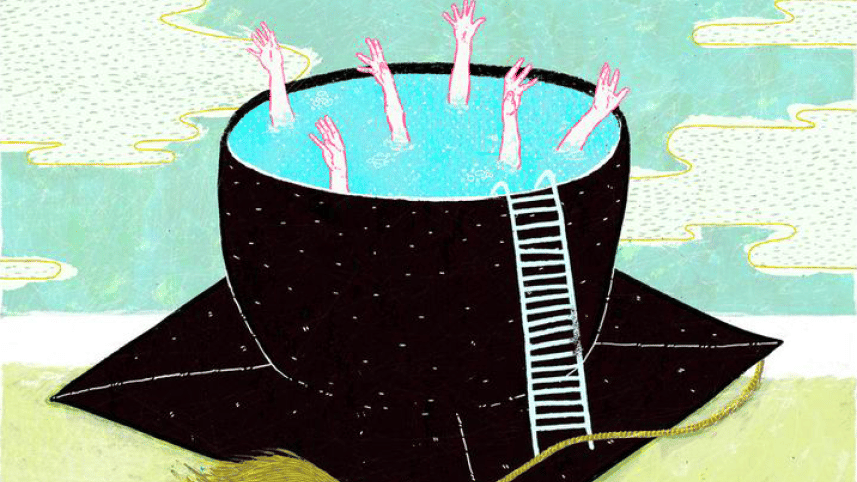Financing tertiary education

Every year, after the university admission tests, we find students who score well, but cannot afford their educational expenses, and eventually drop out. Private banks, on the other hand, offer many lucrative loan products for their customers, including education loans. Education loans, the banks claim, are provided with a view to fulfilling one's dream of higher studies. In reality however, how accessible are these loans to the students who most need them? 21-year-old Adiba Hasnat Deena, who wanted to get admitted to a private medical college in Savar informs that her father managed BDT 15 lakhs by selling off one of their lands in the village, but she needed an extra 15 lakhs for her study. "One of my friends told me about the education loans offered by our banks. I thought the banks will loan me the additional amount, which I could repay after completing my MBBS. But, to my despair, I found out that these loans are actually tailored around the income capacity of parents. Since my father's salary was not up to the required level, I failed to borrow the money from the banks," explains Deena. Deena is now studying chemistry at the University of Dhaka.
Though in developed countries, study loans are issued directly to the students against their merit and future job prospects, here in Bangladesh, the situation is different. In order to get a loan for the purpose of higher education, the parents generally have to earn a minimum of BDT 15,000-20,000 per month, to be repaid within the next one to five years. According to a recent report by Centre for Bangladesh Studies, the average monthly income of the bottom 40 percent was BDT 10,657 in 2015.
Many applicants who wish to borrow money for education purposes share similar bitter experiences about the process. "When I applied for a loan at one of the private banks for my ACCA (Association of Chartered Certified Accountants) degree, the bank authority asked for supporting documents of my admission. But the university authorities would not provide the documents before I officially got admitted there. As a result, I was finally refused," says a student applicant. "However, they offered me a personal loan service against my monthly income, but it was small in proportion to my actual need," she adds. She prefers to remain anonymous because her personal loan application is still being processed.
"Many potential applicants also highlight that the excessive interest rate, which is 10-16 percent in Bangladesh, acts as a deterrent for students and their parents.
According to Md Lutful Haider, Head of Corporate Affairs, Mercantile Bank Limited, when a bank provides loans for educational purposes, it needs to secure the loan as much as possible, and as such, they use cash or property (for example, house, flat or land) as collateral. "When it comes to education loans, the risk of default is higher compared to a home or car loan. And that's why banks need to be quite strict while giving out loans," says the bank official. Mercantile Bank Limited provides education loans for both local and overseas education and offers up to BDT 5 lakhs for local and 20 lakhs for overseas education. It charges 12 percent interest.
Rasheda K Choudhury, Executive Director of Campaign for Popular Education (CAMPE), highlights the importance of education loans in higher education. "Education is one of our basic needs, but the state only provides free education to students up to class eight. What of higher education, where the state cannot ensure free education for all? If we can at least ensure accessible education loans for students, middle and lower income groups will be the beneficiaries," says Choudhury. "But we should bear in mind that the rate of interest should be lowered in order to make it accessible and our banking procedures should be made easier, so that people don't get discouraged."
Many potential applicants also highlight that the excessive interest rate, which is 10-16 percent in Bangladesh, acts as a deterrent for students and their parents. As Anu Muhammad, Professor of Economics, Jahangirnagar University, notes, "We have not yet been able to establish the system of education loans as a feasible option for our students. The rates are exorbitant when compared to the income level of students (or their families) that need the help the most. Even students who have jobs will shy away from taking these loans for fear of debt."
Bank and economic analyst, and former Chief Executive Officer of Citibank NA in Bangladesh, Mamun Rashid sheds light on why the education loan has not yet become popular in our country. "In Bangladesh, we cannot ensure quality education where a student will be able to repay the money, immediately after finishing his/her education. But, in many developed countries the banks show a positive attitude towards students because the job prospects are better. In Bangladesh, it is uncertain whether the students can repay the money within the promised time," says Rashid.
Another problem is that that the central bank does not provide any incentives to the private banks in the form of subsidies, he argues. "If banks were encouraged, maybe they would be more eager to lend money to students," Rashid adds.
However, Anu Muhammad argues that private banks should learn from other countries where education loans are provided at lower rates. "They should not compare student loans with other commercial loans. These should be made available at a minimum profit for the banks," he proposes. "The University Grants Commission (UGC) may form a guideline after discussing the issue with banks, so that an easy repayment student loan service can be introduced," he adds.
Rasheda K Choudhury also argues that we must ensure gender equity and that banks must give priority to women. Otherwise, she believes, people might be more interested in taking loans for male members of the family only.




Comments